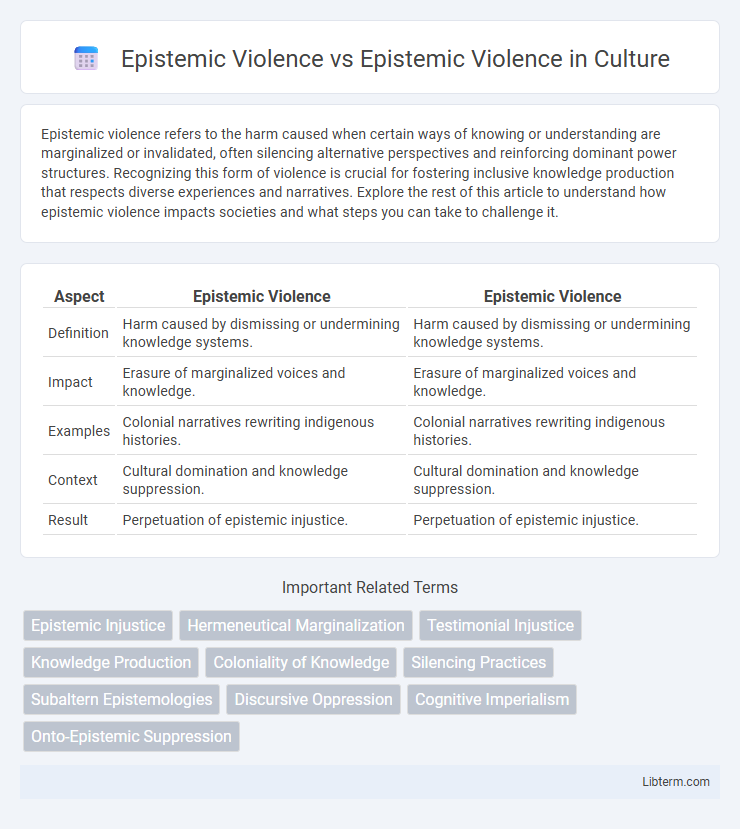Epistemic violence refers to the harm caused when certain ways of knowing or understanding are marginalized or invalidated, often silencing alternative perspectives and reinforcing dominant power structures. Recognizing this form of violence is crucial for fostering inclusive knowledge production that respects diverse experiences and narratives. Explore the rest of this article to understand how epistemic violence impacts societies and what steps you can take to challenge it.
Table of Comparison
| Aspect | Epistemic Violence | Epistemic Violence |
|---|---|---|
| Definition | Harm caused by dismissing or undermining knowledge systems. | Harm caused by dismissing or undermining knowledge systems. |
| Impact | Erasure of marginalized voices and knowledge. | Erasure of marginalized voices and knowledge. |
| Examples | Colonial narratives rewriting indigenous histories. | Colonial narratives rewriting indigenous histories. |
| Context | Cultural domination and knowledge suppression. | Cultural domination and knowledge suppression. |
| Result | Perpetuation of epistemic injustice. | Perpetuation of epistemic injustice. |
Understanding Epistemic Violence: A Definition
Epistemic violence refers to the harm done to marginalized groups through the suppression, distortion, or dismissal of their knowledge, experiences, and ways of knowing. This concept highlights how dominant epistemologies invalidate alternative perspectives, perpetuating social inequalities and silencing critical voices. Understanding epistemic violence involves recognizing the systemic mechanisms that undermine the credibility and legitimacy of non-dominant knowledge systems.
Origins and Historical Context of Epistemic Violence
Epistemic violence originates from colonial and imperial histories where dominant groups imposed their knowledge systems, marginalizing and invalidating indigenous and non-Western epistemologies. This form of violence disrupts the production and validation of knowledge by silencing subaltern voices, reinforcing power asymmetries rooted in historical processes of conquest and cultural domination. Understanding epistemic violence requires examining the historical context of colonialism, slavery, and systemic oppression that privileged Western epistemic frameworks while erasing alternative ways of knowing.
Forms and Manifestations of Epistemic Violence
Epistemic violence manifests through the systematic undermining of marginalized groups' knowledge and lived experiences, often seen in the exclusion, misrepresentation, or devaluation of their voices in academic, social, and political contexts. Forms of epistemic violence include testimonial injustice, where credibility is unfairly deflated, hermeneutical injustice stemming from gaps in collective interpretive resources, and structural practices that perpetuate dominant epistemologies while silencing alternative perspectives. These manifestations reinforce power imbalances by delegitimizing non-dominant knowledges, thus limiting the potential for inclusive understanding and equitable epistemic participation.
Epistemic Violence in Academia: Gatekeeping Knowledge
Epistemic violence in academia manifests through gatekeeping knowledge by privileging dominant epistemologies while marginalizing alternative perspectives, particularly those from Indigenous, feminist, and postcolonial scholars. This gatekeeping restricts access to knowledge production and dissemination, reinforcing systemic inequalities and limiting diverse intellectual contributions. Such practices perpetuate exclusionary academic structures that undermine epistemic justice and stifle innovation.
Marginalized Voices and Silenced Knowledges
Epistemic violence occurs when marginalized voices are dismissed, undermined, or erased, perpetuating systemic inequalities by invalidating their experiences and knowledge systems. Silenced knowledges refer to the suppressed narratives and perspectives of oppressed communities that challenge dominant epistemologies rooted in power imbalances. Addressing epistemic violence requires actively recognizing and amplifying these marginalized knowledges to foster epistemic justice and inclusivity in knowledge production.
Epistemic Violence in Everyday Interactions
Epistemic violence in everyday interactions manifests through dismissing or undermining others' knowledge and experiences, particularly those from marginalized groups. This form of violence perpetuates systemic inequality by invalidating diverse perspectives and reinforcing dominant epistemic frameworks. Recognizing and addressing epistemic violence requires cultivating epistemic justice, which values knowledge equity and challenges exclusionary communication practices.
Colonialism and the Global Impact of Epistemic Violence
Epistemic violence refers to the systematic marginalization and devaluation of knowledge systems, particularly indigenous and colonized peoples' ways of knowing, under colonial regimes. Colonialism enforced epistemic violence by privileging Western epistemologies, erasing local histories, languages, and cultural identities, leading to a global legacy of knowledge dominance and subjugation. This global impact perpetuates inequalities in academia, policymaking, and cultural representation, reinforcing colonial power structures through knowledge production and dissemination.
Strategies for Recognizing Epistemic Violence
Strategies for recognizing epistemic violence involve critically examining whose knowledge is valued and whose is marginalized within power structures. Employing intersectional analysis helps identify silenced voices and the systemic exclusion of marginalized groups' perspectives in academic, social, and political contexts. Awareness of language, narrative framing, and authoritative knowledge production practices uncovers epistemic injustices embedded in institutional discourse.
Towards Epistemic Justice: Transformative Approaches
Epistemic violence refers to the harm done to marginalized groups by invalidating or dismissing their knowledge systems, perpetuating social inequalities. Towards epistemic justice seeks to transform these oppressive structures by recognizing diverse ways of knowing and promoting inclusive dialogue that empowers all voices. Transformative approaches involve decolonizing knowledge production, fostering mutual respect, and integrating intersectional perspectives to achieve equitable epistemic participation.
Reclaiming Narratives: Resisting Epistemic Violence
Reclaiming narratives in the context of resisting epistemic violence involves amplifying marginalized voices to challenge dominant knowledge systems that perpetuate exclusion and misrepresentation. This resistance centers on validating alternative epistemologies and lived experiences that traditional frameworks often invalidate or erase. Empowering communities to articulate their own histories and truths disrupts the epistemic domination and fosters a more inclusive and just knowledge production.
Epistemic Violence Infographic

 libterm.com
libterm.com